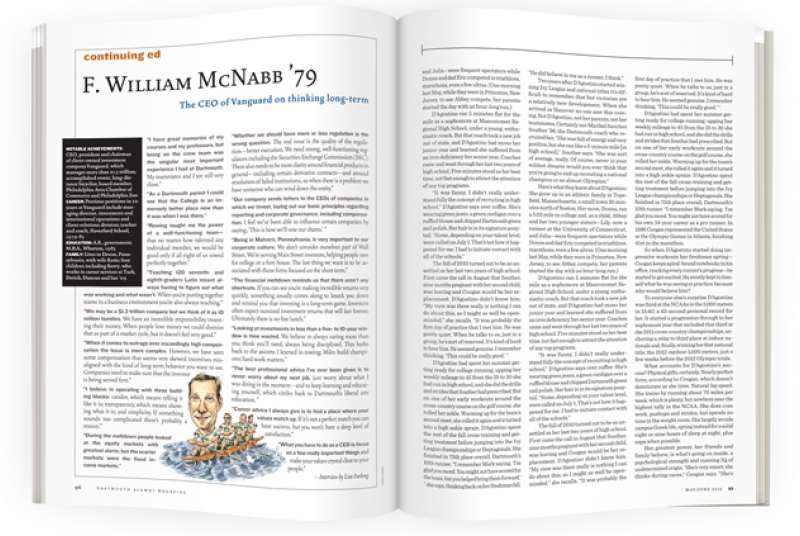
William McNabb ’79
Notable Achievements: CEO, president and chairman of client-owned investment company Vanguard, which manages more than $1.3 trillion; accomplished rower, long-distance bicyclist; board member, Philadelphia Area Chamber of Commerce and Philadelphia Zoo Career: Previous positions in 20 years at Vanguard include managing director, investment and international operations and client-relations division; teacher and coach, Haverford School, 1979-83 Education: A.B., government; M.B.A., Wharton, 1983 Family: Lives in Devon, Pennsylvania, with wife Katie; four children including Kerry, who works in career services at Tuck, Derick, Duncan and Ian ’09
“I have great memories of my courses and my professors, but being on the crew team was the singular most important experience I had at Dartmouth. My teammates and I are still very close.”
“As a Dartmouth parent I could see that the College is an immensely better place now than it was when I was there.”
“Rowing taught me the power of a well-functioning team—that no matter how talented any individual member, we would be good only if all eight of us rowed perfectly together.”
“Teaching 120 seventh- and eighth-graders Latin meant always having to figure out what was working and what wasn’t. When you’re putting together teams in a business environment you’re also always teaching.”
“We may be a $1.3 trillion company but we think of it as 10 million families. We have an incredible responsibility investing their money. When people lose money we could dismiss that as part of a market cycle, but it doesn’t feel very good.”
“When it comes to outrage over exceedingly high compensation the issue is more complex. However, we have seen some compensation that seems very skewed, incentives misaligned with the kind of long-term behavior you want to see. Companies need to make sure that the investor is being served first.”
“I believe in operating with three building blocks: candor, which means telling it like it is; transparency, which means showing what it is; and simplicity. If something sounds too complicated there’s probably a reason.”
“During the meltdown people looked at the equity markets with greatest alarm, but the scarier markets were the fixed income markets.”
“Whether we should have more or less regulation is the wrong question. The real issue is the quality of the regulation—better execution. We need strong, well-functioning regulators including the Securities Exchange Commission (SEC). There also needs to be more clarity around financial products in general—including certain derivative contracts—and around resolution of failed institutions, so when there is a problem we have someone who can wind down the entity.”
“Our company sends letters to the CEOs of companies in which we invest, laying out our basic principles regarding reporting and corporate governance, including compensation. I feel we’ve been able to influence certain companies by saying, ‘This is how we’ll vote our shares.’ ”
“Being in Malvern, Pennsylvania, is very important to our corporate culture. We don’t consider ourselves part of Wall Street. We’re serving Main Street investors, helping people save for college or a first house. The last thing we want is to be associated with those firms focused on the short term.”
“The financial meltdown reminds us that there aren’t any shortcuts. If you can see you’re making incredible returns very quickly, something usually comes along to knock you down and remind you that investing is a long-term game. Investors often expect outsized investment returns that will last forever. Ultimately there is no free lunch.”
“Looking at investments in less than a five- to 10-year window is time wasted. We believe in always saving more than you think you’ll need, always being disciplined. This harks back to the axioms I learned in rowing: Miles build champions; hard work matters.”
“The best professional advice I’ve ever been given is to never worry about my next job, just worry about what I was doing in the moment—and to keep learning and educating yourself, which circles back to Dartmouth’s liberal arts education. ”
“Career advice I always give is to find a place where your values match up. If it’s not a perfect match you can have success, but you won’t have a deep level of satisfaction.”
“What you have to do as a CEO is focus on a few really important things and make your values crystal clear to your people.”
—Interview by Lisa Furlong










